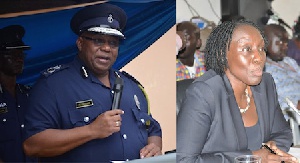-As the state fails to confiscate their assets
There is disquiet among some security capos concerning the failure of the state to confiscate properties, funds and other assets of drug barons and money launderers.
According to them, failure to seize properties timeously even before the conviction of drug barons and money launderers as well as those standing trial sends negative signals to the international community about the fight against drug trafficking and money laundering.
The security capos spoke to The Finder on condition of anonymity in exclusive interviews.
The Managing Director of Sohin Security Company, which provided security services at the Kotoka International Airport, Solomon Adelaquaye, has been convicted in the US for drug trafficking.
Mr Adelaquaye was arrested together with two Nigerians and a Colombian in May last year for their role in a drug trafficking syndicate which had been operating in the West African sub-region.
Investigations by one of the law enforcement agencies revealed substantial properties belonging to Mr Adelaquaye.
In a related development, two Ghanaians, including the owner of Le Baron Hotel at East Legon in Accra, David Kwadwo Anim, were also busted at the Heathrow Airport in London for alleged drug trafficking and money laundering.
The other suspect is Kofi Antwi Nkansah, a businessman.
Another case in point is that of Mr. Eric Amoateng, who was sentenced to 120 months in jail by a United States court in 2007 and has returned to Ghana after serving his 10-year sentence.
He was busted on December 11, 2005 in the US over trafficking of heroin.
The security experts expressed worry that in all these high-profile cases, the state is yet to trace and seize their properties.
Section 24 article one (1) of the Economic and Organised Crime Office (EOCO) Act, Act 804 of 2010 states: “An authorised officer of the Office or any other public officer authorised by the Executive Director shall seize property if the officer has reasonable grounds to suspect that the property is the proceeds of a serious offence.”
Section 33 (1) reads: “Where the Executive Director considers that freezing of property is necessary to facilitate an investigation or trial, the Executive Director may in writing direct the freezing of the property of a person or entity being investigated, or specified property held by a person or entity other than the person or entity being investigated or tried.”
Under the laws of Ghana, assets can be frozen when a person under investigation absconds from the jurisdiction, jumps bail or dies. Indeed, assets can be frozen when those assets are abandoned.
In the event of death, relatives have to prove the frozen assets were legally acquired.
The experts explained that in the event of freezing of assets, the responsibility lies on the accused or the convicted person to prove beyond reasonable doubt that the property being subject of confiscation was acquired legally.
They said one of the reasons for establishing EOCO was that the law that set up the Narcotics Control Board (NACOB) did not adequately provide for confiscation of assets, making it possible for offenders to enjoy their booty after serving their sentences.
A clear example of this is George Adu Bonsu, popularly known as Benjilo, who was convicted and sentenced to 10 years’ imprisonment on charges of dealing in narcotic drugs in 1997.
On Tuesday, February 13, 2007, an Accra Fast Track High Court ordered the immediate release of a number of movable and immovable properties which were confiscated by the state in 1997.
The court, presided over by Justice Victor Ofoe, said the action of the defendants –made up of the Inspector General of Police (IGP), the Narcotics Control Board and the Attorney General (AG) – was unreasonable, arbitrary, unjustifiable and unlawful as he finds no law supporting their action.
The property include the stock of goods in the shop of Benjilo Fabrics Company Limited which got destroyed because the shop was locked; leasehold interests in House Number C618/2, Salaga Market; House Number 521/1, Selwyn Street; House Number C850/4, Abele Road, Kokomlemle; House Number J85, Nungua; an unnumbered warehouse/hospital premises opposite ABC Junction, Alogboshie (now Fourth Street or C297/30 Achimota), Accra.
The rest are an unnumbered property at Number 1 Tantra Hill, TH 59, Tantra Hill in Accra; a GCM Typhoon vehicle with registration number GR 4833 J; a Mercedes Benz 300 with registration number GR 7474 J; and a Nissan Pathfinder with registration number GR 4835 J.
The court further ordered the payment of Ghc100,000 with interest since 1997 at the prevailing commercial rate for the stock of goods destroyed as a result of the unlawful closure of Benjilo Fabrics Company Limited.
In addition, the state was to pay Ghc45,000 per year as loss of use of three vehicles which were also seized.
An award of Ghc9,000 was also to be paid for the rehabilitation of the three vehicles which were left to the vagaries of the weather since May 2001.
The court awarded Ghc8,000 in damages and costs of Ghc5,000 against the state.
The judgement was to be executed by the state through the Inspector General of Police, Narcotics Control Board and the Attorney-General, who were the defendants.
General News of Monday, 13 October 2014
Source: The Finder

















